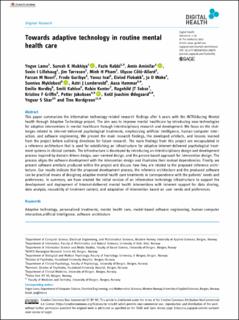| dc.contributor.author | Lamo, Yngve | |
| dc.contributor.author | Mukhiya, Suresh Kumar | |
| dc.contributor.author | Rabbi, Fazle | |
| dc.contributor.author | Aminifar, Amin | |
| dc.contributor.author | Lillehaug, Svein Ivar | |
| dc.contributor.author | Tørresen, Jim | |
| dc.contributor.author | Pham, Minh H. | |
| dc.contributor.author | Côté-Allard, Ulysse Teller Masao | |
| dc.contributor.author | Noori, Farzan Majeed | |
| dc.contributor.author | Guribye, Frode | |
| dc.contributor.author | Inal, Yavuz | |
| dc.contributor.author | Flobak, Eivind | |
| dc.contributor.author | Wake, Jo Dugstad | |
| dc.contributor.author | Myklebost, Sunniva Brurok | |
| dc.contributor.author | Lundervold, Astri J. | |
| dc.contributor.author | Hammar, Åsa Karin | |
| dc.contributor.author | Nordby, Emilie Sektnan | |
| dc.contributor.author | Kahlon, Smiti | |
| dc.contributor.author | Kenter, Robin Maria Francisca | |
| dc.contributor.author | Sekse, Ragnhild Johanne Tveit | |
| dc.contributor.author | Griffin, Kristine Fonnes | |
| dc.contributor.author | Jakobsen, Petter | |
| dc.contributor.author | Ødegaard, Ketil Joachim | |
| dc.contributor.author | Skar, Yngvar Sigmund | |
| dc.contributor.author | Nordgreen, Tine | |
| dc.date.accessioned | 2023-03-09T07:25:26Z | |
| dc.date.available | 2023-03-09T07:25:26Z | |
| dc.date.created | 2022-06-03T15:54:09Z | |
| dc.date.issued | 2022 | |
| dc.identifier.uri | https://hdl.handle.net/11250/3057216 | |
| dc.description.abstract | This paper summarizes the information technology-related research findings after 5 years with the INTROducing Mental health through Adaptive Technology project. The aim was to improve mental healthcare by introducing new technologies for adaptive interventions in mental healthcare through interdisciplinary research and development. We focus on the challenges related to internet-delivered psychological treatments, emphasising artificial intelligence, human-computer interaction, and software engineering. We present the main research findings, the developed artefacts, and lessons learned from the project before outlining directions for future research. The main findings from this project are encapsulated in a reference architecture that is used for establishing an infrastructure for adaptive internet-delivered psychological treatment systems in clinical contexts. The infrastructure is developed by introducing an interdisciplinary design and development process inspired by domain-driven design, user-centred design, and the person based approach for intervention design. The process aligns the software development with the intervention design and illustrates their mutual dependencies. Finally, we present software artefacts produced within the project and discuss how they are related to the proposed reference architecture. Our results indicate that the proposed development process, the reference architecture and the produced software can be practical means of designing adaptive mental health care treatments in correspondence with the patients’ needs and preferences. In summary, we have created the initial version of an information technology infrastructure to support the development and deployment of Internet-delivered mental health interventions with inherent support for data sharing, data analysis, reusability of treatment content, and adaptation of intervention based on user needs and preferences. | en_US |
| dc.language.iso | eng | en_US |
| dc.publisher | SAGE Journals | en_US |
| dc.rights | Navngivelse-Ikkekommersiell 4.0 Internasjonal | * |
| dc.rights.uri | http://creativecommons.org/licenses/by-nc/4.0/deed.no | * |
| dc.title | Towards Adaptive Technology in Routine Mental Healthcare | en_US |
| dc.type | Peer reviewed | en_US |
| dc.type | Journal article | en_US |
| dc.description.version | publishedVersion | en_US |
| dc.rights.holder | © The Author(s) 2022 | en_US |
| dc.source.pagenumber | 1-16 | en_US |
| dc.source.volume | 8 | en_US |
| dc.source.journal | Digital Health | en_US |
| dc.identifier.doi | 10.1177/20552076221128678 | |
| dc.identifier.cristin | 2029432 | |
| dc.relation.project | Norges forskningsråd: 259293 | en_US |
| cristin.ispublished | true | |
| cristin.fulltext | original | |
| cristin.qualitycode | 1 | |

